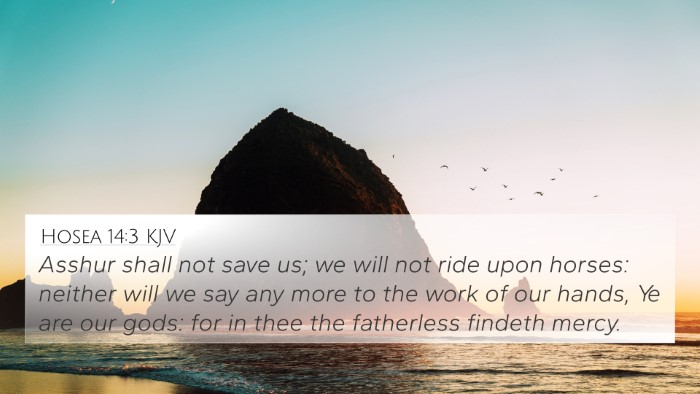Understanding 1 Samuel 7:4
Bible Verse: 1 Samuel 7:4
"Then the children of Israel did put away Baalim and Ashtaroth, and served the LORD only."
Introduction
This verse showcases a pivotal moment in the history of Israel, where the people are called to abandon their idolatrous practices and refocus their devotion on Yahweh alone. The duality of "Baalim" and "Ashtaroth" illustrates the common pagan worship practices in the region, which the Israelites felt compelled to renounce in light of their covenantal relationship with God.
Commentary Insights
-
Matthew Henry:
Henry focuses on the need for repentance and reform among the Israelites, emphasizing that true worship demands the rejection of false gods. He notes that this act of forsaking Baalim and Ashtaroth symbolizes returning back to God in sincerity and truth.
-
Albert Barnes:
Barnes highlights the significance of the collective action of the Israelites in forsaking their idols. He emphasizes that this act is not merely a personal choice but a necessary community effort to realign their identity as God's chosen people.
-
Adam Clarke:
Clarke further explores the cultural implications of this verse and the historical context, noting that Baalim and Ashtaroth were deeply embedded in Canaanite culture. The renunciation of these gods represents a profound shift in Israel's cultural and spiritual landscape.
Thematic Connections
This verse aligns with several broader biblical themes including:
- Repentance: The act of turning away from idolatry and returning to God is a recurring theme throughout Scripture.
- Worship: The exclusive devotion to Yahweh is a foundational tenet in Israel's covenant with God.
- Community Response: The emphasis on collective action speaks to the importance of community in faith practices.
Bible Verse Cross-References
1 Samuel 7:4 can be connected to numerous other passages throughout the Bible, enriching the understanding of this moment in Israelite history:
- Exodus 34:14: "For you shall worship no other god, for the LORD, whose name is Jealous, is a jealous God."
- Deuteronomy 6:13: "You shall fear the LORD your God and serve Him, and shall take oaths in His name."
- Judges 10:10-14: Highlights Israel's cry to the Lord during times of distress followed by God's command to forsake foreign gods.
- Jeremiah 2:27: Critiques Israel for turning away from God, mirroring the choices made by the Israelites in 1 Samuel 7:4.
- Hosea 14:8: Calls Israel to forsake their idols and return to the LORD.
- Matthew 6:24: "No one can serve two masters..." - echoing the message of undivided loyalty to God.
- James 4:4: "Do you not know that friendship with the world is enmity with God?" - a continuation of the call for singular devotion.
Applications for Today
In a modern context, 1 Samuel 7:4 invites believers to examine their lives for any modern "Baalim" and "Ashtaroth"—anything that may take precedence over their relationship with God. Just as the Israelites were asked to collectively reject their idols, today’s believers are called to communal accountability in worship and faithfulness.
Conclusion
The message of 1 Samuel 7:4 transcends its historical setting, providing timeless wisdom about the importance of pure worship and fidelity to God. By understanding the context and connections of this verse through cross-referencing, believers can strengthen their relationship with the divine, ensuring their lives reflect a commitment to serving the LORD only.
Final Reflection
Engaging in cross-referencing Biblical texts like 1 Samuel 7:4 enhances the depth of biblical understanding, revealing a tapestry of interconnected themes that illustrate God's steadfast love and the call for His people to remain dedicated to Him.








